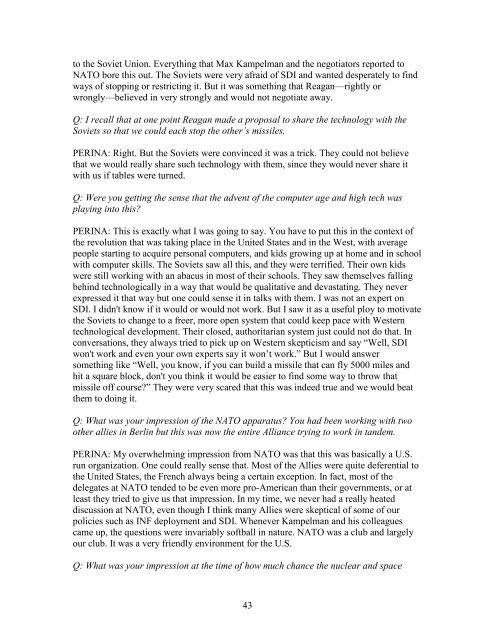ambassador rudolf v. perina - Association for Diplomatic Studies and ...
ambassador rudolf v. perina - Association for Diplomatic Studies and ...
ambassador rudolf v. perina - Association for Diplomatic Studies and ...
You also want an ePaper? Increase the reach of your titles
YUMPU automatically turns print PDFs into web optimized ePapers that Google loves.
to the Soviet Union. Everything that Max Kampelman <strong>and</strong> the negotiators reported to<br />
NATO bore this out. The Soviets were very afraid of SDI <strong>and</strong> wanted desperately to find<br />
ways of stopping or restricting it. But it was something that Reagan—rightly or<br />
wrongly—believed in very strongly <strong>and</strong> would not negotiate away.<br />
Q: I recall that at one point Reagan made a proposal to share the technology with the<br />
Soviets so that we could each stop the other’s missiles.<br />
PERINA: Right. But the Soviets were convinced it was a trick. They could not believe<br />
that we would really share such technology with them, since they would never share it<br />
with us if tables were turned.<br />
Q: Were you getting the sense that the advent of the computer age <strong>and</strong> high tech was<br />
playing into this?<br />
PERINA: This is exactly what I was going to say. You have to put this in the context of<br />
the revolution that was taking place in the United States <strong>and</strong> in the West, with average<br />
people starting to acquire personal computers, <strong>and</strong> kids growing up at home <strong>and</strong> in school<br />
with computer skills. The Soviets saw all this, <strong>and</strong> they were terrified. Their own kids<br />
were still working with an abacus in most of their schools. They saw themselves falling<br />
behind technologically in a way that would be qualitative <strong>and</strong> devastating. They never<br />
expressed it that way but one could sense it in talks with them. I was not an expert on<br />
SDI. I didn't know if it would or would not work. But I saw it as a useful ploy to motivate<br />
the Soviets to change to a freer, more open system that could keep pace with Western<br />
technological development. Their closed, authoritarian system just could not do that. In<br />
conversations, they always tried to pick up on Western skepticism <strong>and</strong> say “Well, SDI<br />
won't work <strong>and</strong> even your own experts say it won’t work.” But I would answer<br />
something like “Well, you know, if you can build a missile that can fly 5000 miles <strong>and</strong><br />
hit a square block, don't you think it would be easier to find some way to throw that<br />
missile off course?” They were very scared that this was indeed true <strong>and</strong> we would beat<br />
them to doing it.<br />
Q: What was your impression of the NATO apparatus? You had been working with two<br />
other allies in Berlin but this was now the entire Alliance trying to work in t<strong>and</strong>em.<br />
PERINA: My overwhelming impression from NATO was that this was basically a U.S.<br />
run organization. One could really sense that. Most of the Allies were quite deferential to<br />
the United States, the French always being a certain exception. In fact, most of the<br />
delegates at NATO tended to be even more pro-American than their governments, or at<br />
least they tried to give us that impression. In my time, we never had a really heated<br />
discussion at NATO, even though I think many Allies were skeptical of some of our<br />
policies such as INF deployment <strong>and</strong> SDI. Whenever Kampelman <strong>and</strong> his colleagues<br />
came up, the questions were invariably softball in nature. NATO was a club <strong>and</strong> largely<br />
our club. It was a very friendly environment <strong>for</strong> the U.S.<br />
Q: What was your impression at the time of how much chance the nuclear <strong>and</strong> space<br />
43
















